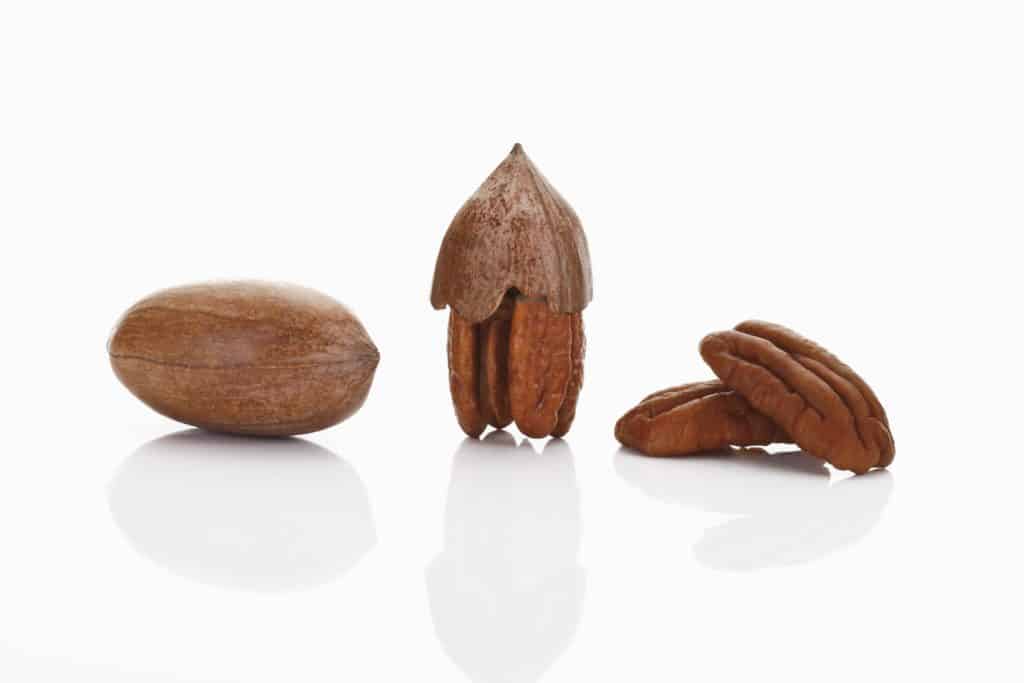Breakthrough Research
The National Pecan Shellers Association has spent the past two decades as the leading resource for pecan information to industry, media, consumer, culinary and health professionals; promoting research that supports the health benefits of pecans; encouraging culinary professionals to include pecans in their recipes and new product development; and inspiring consumers to integrate pecans into their diets and lifestyles.
Among these programs have been best practices related to food safety and original research on processing and sanitation procedures, business benchmarks through labor & wage and operating ratio surveys, size and color standards, statistical programs covering crop size and product inventories, regular reports and updates from Washington, D.C., and so much more.

New Study
Pecan-rich diet significantly improved insulin sensitivity in adults who are overweight or obese
A new study published in Nutrients shows that eating just 1.5 ounces of pecans – one small handful – every day may protect adults at risk for developing cardiovascular disease (CVD) and type 2 diabetes (T2D).
Conducted by researchers at the Jean Mayer USDA Human Nutrition Research Center on Aging at Tufts University, this study found that incorporating pecans into a typical American diet significantly improved insulin sensitivity and had a significant effect on markers of cardiometabolic disease in otherwise healthy overweight and obese adults with excess belly fat.
The study entitled “A Pecan-Rich Diet Improves Cardiometabolic Risk Factors in Overweight and Obese Adults: A Randomized Controlled Trial” is available online and will be presented at the American Society for Nutrition Annual Conference, Nutrition 2018 held in Boston this June. ]
The study was funded by the National Pecan Shellers Association.
Landmark Studies
For nearly two decades, NPSA funded research has confirmed that pecans can be a healthy addition to your diet. Below are summaries of landmark research studies confirming the health benefits associated with eating a diet rich in pecans. Summaries of these breakthrough studies are posted here.
In 2018, a study from Tufts University was completed and the results published. And there is good news to share according to lead researcher Dr. Diane McKay, “A pecan-rich diet improves cardiometabolic risk factors in overweight and obese adults.” The major conclusions from the research are that “When incorporated into a diet that is low in fiber and high in saturated fat, i.e., the average American diet, 1.5 ounces of pecans per day (per 2000 kcal) for four weeks, significantly improves fasting blood glucose and insulin levels in middle aged and older, overweight or obese adults with abdominal adiposity.” The scientific implications are “A pecan-rich diet may have a general benefit in modifying metabolic risk factors for many U.S. adults.”
Naturally-occurring antioxidants in pecans may help contribute to heart health and disease prevention, according to a study at Loma Linda University. The results were published in the January 2011 issue of The Journal of Nutrition. In addition, landmark research published in the Journal of Agriculture and Food Chemistry (June 2004) found that pecans rank highest among all nuts and are among the top category of foods to contain the highest antioxidant capacity, meaning pecans may decrease the risk of cancer, coronary heart disease and neurological diseases such as Alzheimer’s.
Research conducted by the University of Georgia has also confirmed that pecans contain plant sterols, which are known for their cholesterol-lowering ability. The U.S. Food and Drug Administration (FDA) has acknowledged this and related research and approved the following qualified health claim: “Scientific evidence suggests, but does not prove, that eating 1.5 ounces per day of most nuts, such as pecans, as part of a diet low in saturated fat and cholesterol, may reduce the risk of heart disease.”
Milestone research published in the Journal of Agriculture and Food Chemistry in June 2004 found that pecans rank highest among all nuts and are among the top category of foods to contain the highest antioxidant capacity, meaning pecans may decrease the risk of cancer, coronary heart disease and neurological diseases such as Alzheimer’s.
Health Benefits of Pecans
Findings from a 2001 study conducted at Loma Linda University1 showed that adding just a handful of pecans to your diet each day may help inhibit unwanted oxidation of blood lipids, thus helping prevent coronary heart disease.
Ways to Incorporate Pecans into a Healthy Lifestyle
Pecans are easy to add to your eating plan; simply grab a handful! Pecans are healthy and delicious, and just a one-ounce serving (15- 20 pecan halves) packs more than 19 vitamins and minerals, fiber and protein to keep you going. They’re a perfect snack for both children and adults.
Often associated with indulgences and occasional treats, pecans can also be eaten in healthier forms and cooked or baked in a wide variety of foods to add flavor and nutrition. Delicious recipes can be found or created using pecans for breakfast, salads, entrees and side dishes.
Pecan recipes and downloadable images of foods incorporating pecans can be found in the cookbook or the recipe section.


